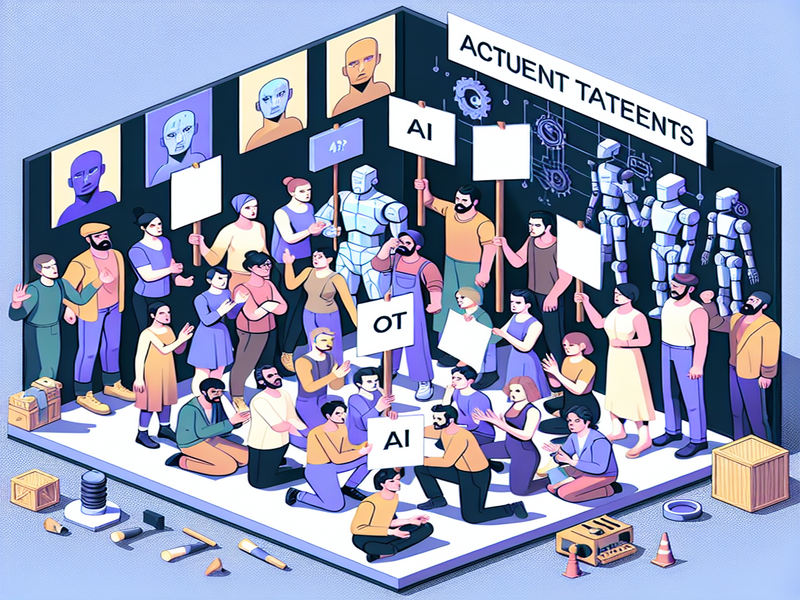- Updated: July 26, 2024
- 4 min read
Actors Strike Over AI Use in Video Games
Actors Raise Concerns Over AI Reproducing Voices and Appearances in Video Games
The video game industry is facing a significant challenge as Hollywood performers have gone on strike against major studios over the use of artificial intelligence (AI) technology. The strike, called by the Screen Actors Guild-American Federation of Television and Radio Artists (SAG-AFTRA), has paralyzed the industry and highlighted the growing concerns surrounding the ethical and fair use of AI in the entertainment sector.
At the heart of the dispute lies the performers’ worry that generative AI could be used to reproduce their voices and physical appearances to animate video game characters without providing them with fair compensation. Despite a year and a half of negotiations between the video game producers and the union representing over 2,500 video game performers, the two sides have failed to reach an agreement on protections related to the use of AI technology.
“Although agreements have been reached on many issues, the employers refuse to plainly affirm, in clear and enforceable language, that they will protect all performers covered by this contract in their AI language,” SAG-AFTRA said in a statement. “We’re not going to consent to a contract that allows companies to abuse AI to the detriment of our members.”
Negotiations Stall Over AI Protections
The strike follows a period of intense negotiations between SAG-AFTRA and major video game producers, including Activision, Warner Bros, and Walt Disney. While the two sides have agreed on several key issues, such as wages and job safety, the protections related to the use of AI technology remain a significant hurdle.
The video game studios, however, claim that they have already made sufficient concessions to address the union’s demands. “Our offer is directly responsive to SAG-AFTRA’s concerns and extends meaningful AI protections that include requiring consent and fair compensation to all performers working under the [Interactive Media Agreement],” said Audrey Cooling, a spokesperson for the 10 video game producers negotiating with SAG-AFTRA.
The Interactive Media Agreement covers artists who provide voiceover services and on-camera work used to create video game characters. The previous agreement, which did not provide AI protections, expired in November 2022 and has been extended on a monthly basis while talks continued.
Lessons from Hollywood’s AI Strike
The ongoing strike in the video game industry comes on the heels of a successful strike by TV and film actors in the US last year. In that instance, SAG-AFTRA secured $1 billion in new pay and benefits, as well as safeguards on the use of AI, following a 118-day strike – the longest in the union’s 90-year history.
Combined with a separate writers’ strike, the actions severely disrupted film and TV production and cost California’s economy more than $6.5 billion, according to entertainment industry publication Deadline. The video game industry is now facing a similar challenge, with the potential for significant economic consequences if the strike continues.
Implications and Potential Outcomes
The ongoing strike has far-reaching implications for the video game industry and the broader entertainment sector. As AI technology continues to advance, the debate over its ethical and fair use will only intensify. While video game producers argue that AI can enhance creativity and efficiency, performers are concerned about the potential for exploitation and the erosion of their livelihoods.
The resolution of this strike will likely set a precedent for how the industry approaches the use of AI in the future. If the performers’ demands are met, it could lead to stronger protections and fair compensation for the use of their likenesses and voices. Alternatively, a failure to reach an agreement could pave the way for increased adoption of AI technology without adequate safeguards, potentially exacerbating the tensions between performers and producers.
As the strike continues, both sides will need to find common ground and strike a balance between embracing technological advancements and protecting the rights and livelihoods of performers. The outcome of these negotiations will have ripple effects throughout the entertainment industry and could shape the future of AI’s role in creative endeavors.
Conclusion and Call to Action
The actors’ strike over AI usage in video games has brought to the forefront the pressing need for clear guidelines and regulations surrounding the ethical and fair use of this technology. As consumers and industry stakeholders, it is crucial to support efforts that prioritize the rights and well-being of performers while also embracing innovation.
Stay informed about the latest developments in this ongoing dispute by following trusted news sources and industry publications. Additionally, consider voicing your support for fair AI practices by engaging with relevant organizations and advocacy groups. Together, we can shape a future where technological advancements and creative expression coexist harmoniously, with respect for the talents and contributions of all involved.

